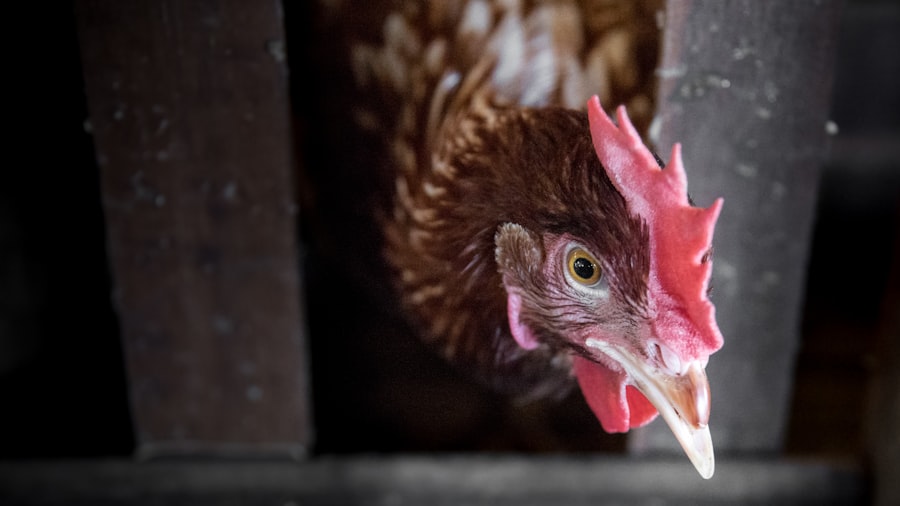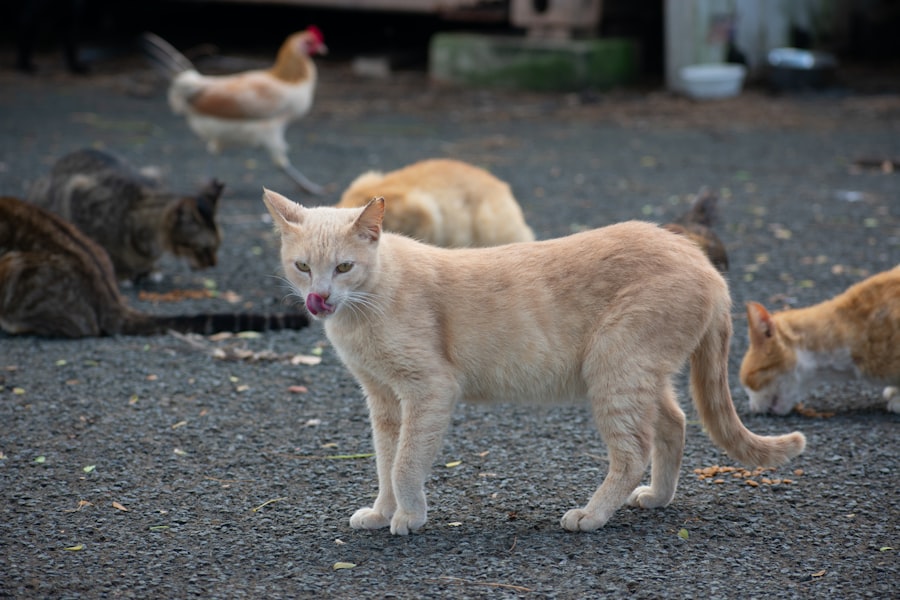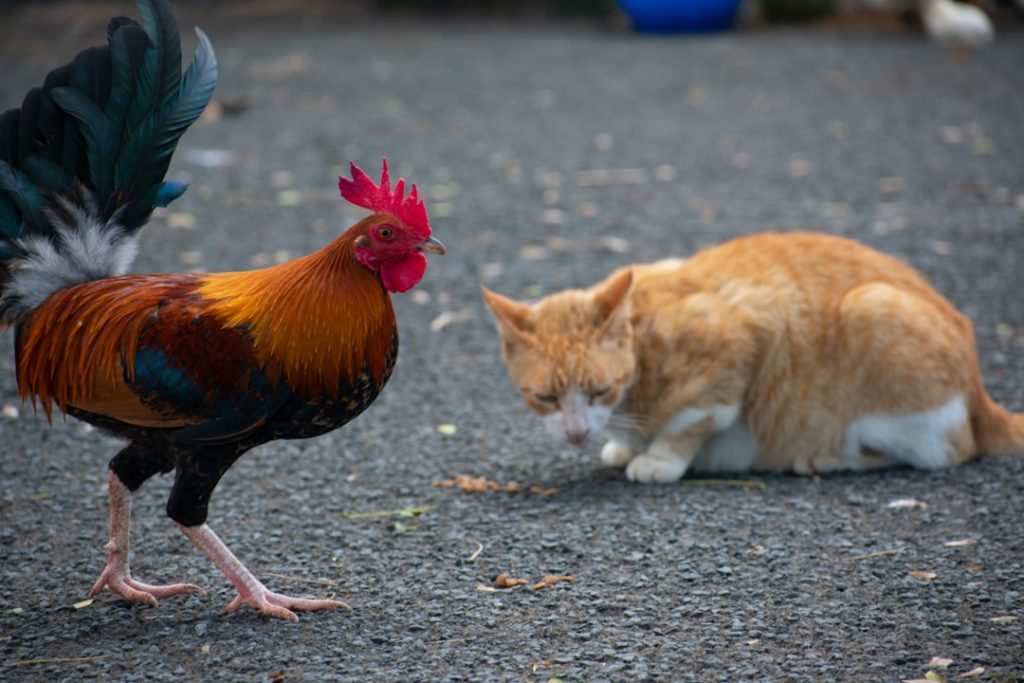Cats and chickens are distinct domesticated species with a long history of human interaction. Felines are renowned for their autonomous behavior and hunting instincts, whereas chickens are gregarious avian creatures primarily raised for egg production and meat consumption. The dynamic between cats and chickens is often characterized by a predator-prey relationship, given the cat’s natural inclination to hunt.
Despite this inherent tension, numerous individuals maintain both cats and chickens on their properties. It is crucial to comprehend the potential effects cats may have on chickens, as well as the advantages and disadvantages of cohabitation between these two species in a shared environment.
Table of Contents
- 1 The natural instincts of cats and their potential impact on chickens
- 2 The potential benefits of having cats around chickens
- 3 The potential drawbacks of having cats around chickens
- 4 Tips for managing cats and chickens in the same environment
- 5 Other potential predators of chickens and how cats may or may not deter them
- 6 Conclusion and final thoughts on the relationship between cats and chickens
- 7 FAQs
Key Takeaways
- Cats and chickens can coexist in the same environment, but it’s important to understand the natural instincts of both animals and how they may interact with each other.
- Cats have a natural instinct to hunt and may pose a threat to chickens, especially if they are not properly managed or supervised.
- Having cats around chickens can help deter other potential predators, such as rodents or snakes, from entering the chicken coop or yard.
- The presence of cats around chickens can also lead to stress and anxiety for the birds, potentially impacting their egg production and overall well-being.
- To manage cats and chickens in the same environment, it’s important to provide secure housing for the chickens, supervise interactions between the animals, and consider using deterrents to keep cats away from the coop.
The natural instincts of cats and their potential impact on chickens
The Hunting Instinct
Cats are natural predators with a strong instinct to stalk and catch prey. This instinct is deeply ingrained in their behavior, and even domesticated cats will often exhibit hunting behaviors. When cats are around chickens, their predatory instincts may be triggered, and they may see the chickens as potential prey.
The Risks of Coexistence
Cats may stalk, chase, and even attack chickens, which can be very distressing for the birds. Additionally, cats are known for their agility and stealth, making it difficult for chickens to escape from them. This can lead to stress and injury for the chickens, as well as a decrease in egg production and overall well-being.
Unpredictable Behavior
On the other hand, some cats may not show much interest in hunting chickens, especially if they have been raised around them from a young age. However, it is important to remember that cats are predators by nature, and their behavior can be unpredictable. Even the most well-behaved cat may still be triggered by the sight or sound of a chicken, so it is important to be cautious when introducing cats to a chicken environment.
The potential benefits of having cats around chickens

Despite their predatory nature, cats can actually provide some benefits when it comes to keeping chickens. One of the main benefits is their ability to control rodent populations. Cats are natural hunters of mice and rats, which are common pests in chicken coops.
By keeping cats around the chicken coop, you can help to keep these pests at bay, which can ultimately benefit the health and well-being of the chickens. Additionally, cats can also help to deter other potential predators, such as snakes or smaller birds of prey, from entering the chicken coop area. Furthermore, some cats may form a bond with the chickens and act as protectors rather than predators.
They may establish a territory around the coop and keep other animals away, which can help to create a safer environment for the chickens. In some cases, cats and chickens may even form a symbiotic relationship, where they coexist peacefully and provide companionship for each other. This can be especially beneficial for free-range chickens, as the presence of a cat can help to keep them safe from other predators while they roam around the property.
The potential drawbacks of having cats around chickens
While there are potential benefits to having cats around chickens, there are also significant drawbacks that need to be considered. As mentioned earlier, cats are natural hunters with a strong instinct to chase and catch prey. This means that even well-fed domesticated cats may still pose a threat to chickens, especially if they are left unsupervised in the same area.
Cats may injure or kill chickens, which can be distressing for both the birds and their owners. Additionally, the presence of a cat can cause stress for the chickens, which can lead to a decrease in egg production and overall health. Another potential drawback of having cats around chickens is the risk of disease transmission.
Cats that hunt and catch wild animals may carry parasites or diseases that can be harmful to chickens. Additionally, cat feces can contain harmful bacteria such as Toxoplasma gondii, which can pose a risk to both chickens and humans. It is important to keep this in mind when considering the presence of cats in a chicken environment, as proper hygiene and disease prevention measures need to be taken into account.
Tips for managing cats and chickens in the same environment
If you are considering keeping both cats and chickens on your property, there are several tips for managing them in the same environment. Firstly, it is important to provide a secure and predator-proof chicken coop or run to keep the birds safe from potential threats. This can help to minimize the risk of cat attacks and provide a safe space for the chickens to roost and lay eggs.
Additionally, it is important to supervise interactions between cats and chickens, especially when they are first introduced to each other. This can help to gauge the behavior of both animals and ensure that they can coexist peacefully. Furthermore, providing enrichment for both cats and chickens can help to reduce predatory behaviors and promote positive interactions.
For example, providing toys and climbing structures for cats can help to redirect their hunting instincts away from the chickens. Similarly, providing ample space for chickens to roam and access to fresh food and water can help to reduce stress and promote overall well-being. It is also important to monitor the health of both cats and chickens regularly and seek veterinary care if any issues arise.
Other potential predators of chickens and how cats may or may not deter them

Effectiveness of Cats as Deterrents
Cats may or may not deter these predators depending on their size and behavior. For example, larger predators such as foxes or dogs may not be deterred by the presence of a cat, especially if they are determined to catch prey. However, smaller predators such as snakes or birds of prey may be more likely to be deterred by the presence of a cat in the area.
Limitations of Cats as a Solution
It is important to remember that while cats can help to control rodent populations and deter some predators, they are not a foolproof solution for protecting chickens from all potential threats.
Additional Measures for Predator-Proofing
Proper predator-proofing measures need to be taken to ensure the safety of the birds, such as securing coops and runs with sturdy fencing and wire mesh. Additionally, it is important to be aware of local wildlife and take precautions to minimize the risk of predation, such as keeping food sources secure and avoiding leaving chickens unattended in open areas.
Conclusion and final thoughts on the relationship between cats and chickens
In conclusion, the relationship between cats and chickens can be complex and requires careful consideration when managing them in the same environment. While cats have natural predatory instincts that may pose a threat to chickens, they can also provide benefits such as pest control and protection from other predators. It is important to weigh the potential benefits and drawbacks of having cats around chickens and take proactive measures to ensure the safety and well-being of both animals.
Ultimately, successful coexistence between cats and chickens requires careful management, supervision, and consideration of the individual behaviors of both animals. By providing a secure environment for chickens, monitoring interactions between cats and chickens, and taking steps to minimize potential risks such as disease transmission or predation, it is possible for them to coexist peacefully. With proper care and attention, cats and chickens can live harmoniously on the same property, providing companionship and practical benefits for their owners.
If you’re considering getting chickens and want to ensure they are safe from predators, you may be interested in an article on Poultry Wizard about the benefits of using a Snaplock chicken coop. This article discusses how this type of coop can help keep your chickens safe from potential threats, including cats. https://poultrywizard.com/keeping-chickens/snaplock-chicken-coop/
FAQs
What is the relationship between cats and chickens?
Cats are natural hunters and may pose a threat to chickens. They may see chickens as prey and attempt to hunt them.
Do cats keep chickens away?
In some cases, cats may keep smaller pests away from chickens, such as mice or rats. However, they may also pose a threat to the chickens themselves.
How can I protect my chickens from cats?
To protect chickens from cats, it’s important to provide secure housing and enclosures for the chickens. This can include a sturdy coop and run that is predator-proof.
Are there any benefits to having cats around chickens?
Cats may help to keep smaller pests away from the chicken coop, such as mice or rats. However, their presence may also cause stress to the chickens.
Can cats and chickens coexist peacefully?
With proper management and supervision, cats and chickens can coexist peacefully. However, it’s important to ensure the safety and well-being of the chickens is prioritized.
Meet Walter, the feathered-friend fanatic of Florida! Nestled in the sunshine state, Walter struts through life with his feathered companions, clucking his way to happiness. With a coop that’s fancier than a five-star hotel, he’s the Don Juan of the chicken world. When he’s not teaching his hens to do the cha-cha, you’ll find him in a heated debate with his prized rooster, Sir Clucks-a-Lot. Walter’s poultry passion is no yolk; he’s the sunny-side-up guy you never knew you needed in your flock of friends!







